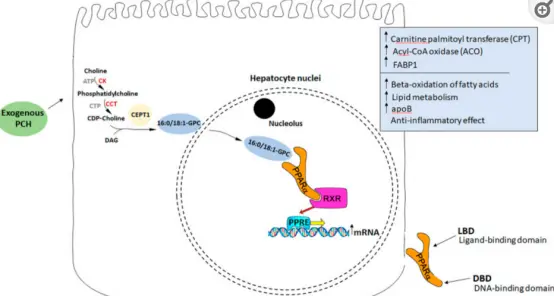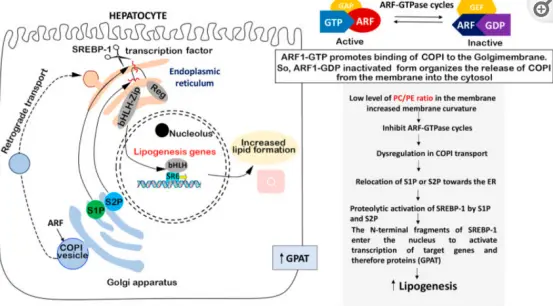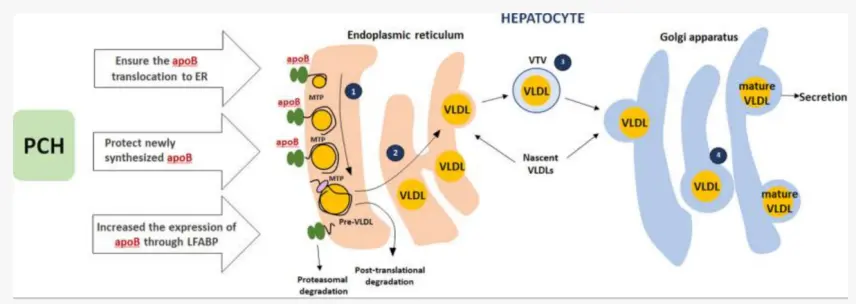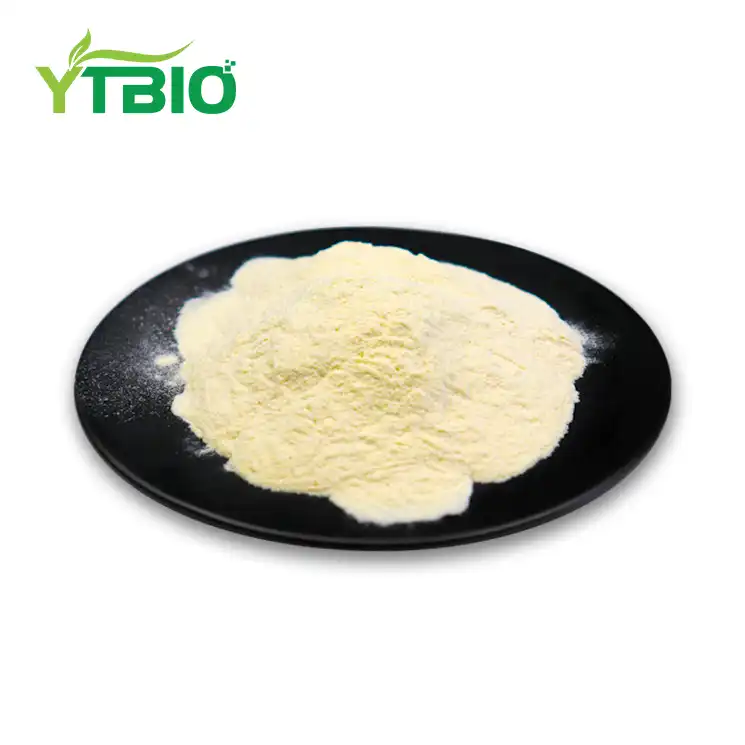Sunflower Phosphatidylcholine
Specifications: 70%
Appearance: Light Yellow Powder
Source: Sunflower
Package: 25Kg/barrel
Shipping Speed: 3-5 days
Shipping: DHL,FedEx,TNT,EMS,SF
Certificates:cGMP,ISO22000,ISO9001,EU&NOP Organic Certificate,Kosher,BRC,Halal,HACCP
- Fast Delievery
- Quality Assurance
- 24/7 Customer Service
Product Introduction
What Is Sunflower Phosphatidylcholine?
Sunflower phosphatidylcholine is extracted from sunflower seeds or sunflower lecithin. It is one of the main phospholipid components in sunflower seed oil and a phospholipid compound, a type of natural lecithin. Phosphatidylcholine (PC) is an extremely important phospholipid, a key component of cell membranes and a central role in many physiological functions in the human body. It is widely present in food and human tissues and has important applications in health supplements and medicine.


Foods where phosphatidylcholine is widely found include:
Egg yolk: one of the richest and most common sources;
Soybeans: rich in phosphatidylcholine and a major source in commercial supplements;
Animal liver: such as beef and chicken liver;
Oilseeds such as peanuts and sunflower seeds;
Meat and fish;
Structure
Phosphatidylcholine belongs to the phospholipid class of compounds. Its molecular structure consists of:
A glycerol backbone: serves as the molecular foundation, connecting the other components. Two fatty acid chains: typically one saturated and the other unsaturated, which affect cell membrane fluidity.
Phosphate group: Connects glycerol to choline, forming a hydrophilic head group.
Choline: An essential nutrient involved in neurotransmitter synthesis and methyl cycling.
YTBIO: Providing High-Quality Sunflower Phosphatidylcholine and Services
High-quality nutritional supplements are crucial to your health journey. YTBIO specializes in providing high-quality Sunflower phosphatidylcholine.
Why choose YTBIO? We hold the following certifications:
- cGMP, ISO9001, and ISO22000 certifications ensure rigorous quality control throughout the entire process;
- BRC and HACCP system certifications ensure product safety and reliability;
- EU and NOP organic, kosher, and halal certifications meet various global standards and dietary requirements.
We specialize in the research, development, and production of natural plant extracts, cosmetic active ingredients, and health foods. We primarily produce plant extracts, health food ingredients, and a variety of end-use products, including capsules, softgels, granular capsules, gummies, tablets, and solid beverages. Our production facilities and equipment meet national standards, and our production processes strictly adhere to GMP requirements. If you have any questions, please feel free to contact us at sales@sxytorganic.com
What Are The Core Benefits Of Sunflower Phosphatidylcholine?
Supports liver health: As a key component of cell membranes, sunflower phosphatidylcholine helps repair damaged liver cells, promotes fat metabolism, and prevents fatty liver disease.
Improves cardiovascular function: It emulsifies cholesterol, reduces cholesterol deposition in blood vessels, helps regulate blood lipid levels, and reduces the risk of atherosclerosis.
Boosts brain function: As a precursor to acetylcholine, it supports neurotransmitter synthesis, helping improve memory, cognitive function, and nervous system health.
Enhances cell membrane function: Maintains cell structural integrity and promotes intercellular signaling and material exchange.
Assists fat metabolism: Helps emulsify fat in the intestines, promoting fat absorption and utilization, and supporting overall metabolic health.
What Are The Applications Of Sunflower Phosphatidylcholine?
In the pharmaceutical field, this ingredient can be used as an adjunctive treatment for liver-related diseases, such as fatty liver and hepatitis, by promoting liver cell repair and fat metabolism. It is also used in cardiovascular health as an ingredient to help regulate blood lipids and prevent atherosclerosis. In the nervous system, as a precursor to acetylcholine, it is used to support memory and cognitive function.
In nutritional health, it is used as a dietary supplement to provide choline, which assists with cell membrane repair, liver detoxification, and brain health. It is also commonly used in infant formula to support early neurodevelopment and brain health.
In the cosmetics and skincare industry, this ingredient has moisturizing and repairing properties, strengthening the skin barrier, alleviating dryness and sensitivity, and, by maintaining cell membrane function, helping to slow skin aging to a certain extent.
In the food industry, it is used as an emulsifier in products such as chocolate, ice cream, and baked goods to improve texture and taste. It can also be added as a nutritional fortifier to various health foods.
In the biotechnology and pharmaceutical formulation fields, this ingredient is a key material in the construction of liposomal drug delivery systems, enhancing drug stability and targeted delivery.
Sunflower Phosphatidylcholine: Four Mechanisms for Treating Fatty Liver Disease
Sunflower phosphatidylcholine is a nutritional precursor of acetylcholine, a crucial brain chemical (neurotransmitter) involved in memory and thinking. Phosphatidylcholine participates in the breakdown of body fat, influences liver and gallbladder function, and enhances mental function. It is also essential for building cell membranes, improving nerve cell efficiency, and repairing neurons.
In our daily lives, foods rich in lecithin are the best dietary sources of PC. So, what phosphatidylcholine is effective in treating non-alcoholic fatty liver disease?
A 2022 paper published in Frontiers in Pharmacology systematically explored the role of phospholipids rich in phosphatidylcholine (PC) in the treatment of fatty liver disease and provided multiple clinical evidence demonstrating that phosphatidylcholine intake can improve hepatic steatosis.
The article noted that non-alcoholic fatty liver disease (NAFLD) has become a major cause of chronic liver disease (CLD), and its prevalence is increasing. Currently, lifestyle interventions are the primary treatment for NAFLD, but these are ineffective in most patients.
Essential phospholipids (EPLs) in the human body are key structural and functional components of cell membranes and are crucial for maintaining cell membrane integrity. Studies have demonstrated that EPLs can improve liver health in NAFLD. Their core active ingredient is phosphatidylcholine (PC). PC accounts for a significant proportion of total phospholipids in EPLs (72%-96%) and plays a central role in cell membrane synthesis and maintenance. It is also essential for the synthesis and secretion of lipoproteins (such as very low-density lipoprotein (VLDL)).
Specifically, phosphatidylcholine improves fatty liver disease through the following four mechanisms:
Promoting fatty acid β-oxidation:
PC promotes fatty acid β-oxidation by activating peroxisome proliferator-activated receptor α (PPARα). PPARα is a key transcription factor regulating fatty acid and triglyceride metabolism. Studies have shown that PPARα deficiency in hepatocytes leads to lipid accumulation even in fasting states. PC, as an endogenous ligand, activates PPARα, thereby increasing the expression of genes involved in fatty acid oxidation.

Inhibition of fatty acid synthesis:
PC reduces fatty acid synthesis by inhibiting sterol regulatory element binding protein-1c (SREBP-1c) and its downstream enzymes (such as GPAT). SREBP-1c is a key regulator of the initiation of triglyceride synthesis, and PC modulates lipogenesis by affecting its activity, thereby reducing fat accumulation in the liver.

Promoting fatty acid excretion:
PC facilitates fatty acid excretion from the liver through multiple steps:
Assisting in the transport of apolipoprotein B (apoB) from the cytoplasm to the endoplasmic reticulum, initiating VLDL assembly;
Promoting VLDL lipidation and maturation within the endoplasmic reticulum;
Transporting VLDL to the Golgi apparatus via transport vesicles for modification;
Finally, by increasing apoB expression, PC promotes VLDL secretion, transporting fatty acids out of the liver for utilization by other tissues.

Impacting nutrient absorption:
Several studies have shown that sunflower phosphatidylcholine can inhibit cholesterol absorption in the intestine. Its mechanisms include interfering with micelle hydrolysis, altering their physicochemical properties, and affecting transport proteins on the intestinal cell membrane. Furthermore, phospholipid intake can significantly reduce cholesterol and triglyceride levels in the lymph and blood. This cholesterol-lowering effect is particularly pronounced when PC molecules carry saturated fatty acids. Human studies have also consistently demonstrated that phospholipids inhibit cholesterol digestion.
Sunflower Phosphatidylcholine vs. Soy Phosphatidylcholine
|
Characteristics |
Soy Phosphatidylcholine |
Sunflower Phosphatidylcholine |
|
Source and Cultivation |
Soybeans (widely cultivated worldwide) |
Sunflower (grown in specific regions) |
|
GMO Risks |
High (mainly genetically modified crops) |
Low (mostly non-GMO) |
|
Allergens |
Yes (soybeans are one of the eight major allergens) |
No (very common allergens) |
|
Phytoestrogens |
Contains (soy isoflavones) |
Contains no |
|
Odor/Taste |
May have a beany odor |
Mild, slightly nutty aroma |
|
Purity and Potency |
Can achieve high purity and consistent biological activity |
Can achieve high purity and consistent bioactivity |
|
Price |
Relatively affordable |
Generally more expensive |
|
Market Awareness |
High quality, traditional mainstream source |
Newer, but growing rapidly as a high-end option |
YTBIO has own factory and R&D team, dedicated to providing you with high-quality Sunflower Phosphatidylcholine and services. If you have any questions or needs, please contact us and we will respond to you as soon as possible.
FAQ
Q: What specifications do you offer for sunflower phosphatidylcholine?
A: We have sunflower phosphatidylcholine 70%. We also offer soy phosphatidylcholine (90% and 70%).
Q: What certifications do you hold?
A: We prioritize product quality and safety, and our production facilities hold several top international certifications, including:
· cGMP
· ISO9001 and ISO22000
· BRC
· HACCP
· EU and NOP organic certifications
· Kosher certification
· Halal certification
Q: Do you provide third-party test reports (COAs) for your products?
A: Of course. We provide a COA with every batch.
Q: Do you offer custom products and technical support?
A: Yes, we have a strong R&D team. In addition to standard products, we can also provide customized dosage forms and customized packaging to meet your specific needs.
Our technical team is always ready to provide comprehensive technical support, including product application and formulation advice.
_1737093401309.png)

